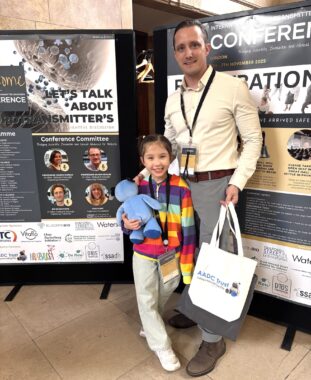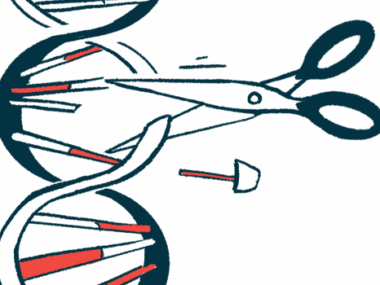Unlocking gene therapy’s potential for neurotransmitter disorders
A recent conference brought together scientists, clinicians, and families
Written by |

Last week, Judy, my wife, and I had the privilege of attending the International Neurotransmitter Disorders Conference (INDConf), held Nov. 5-7 at Goodenough College in London.
Nestled in the heart of Bloomsbury, the historic venue provided an inspiring setting filled with warmth, collaboration, and academic energy. The event brought together scientists, clinicians, and families united by a shared mission to improve care and outcomes for people living with neurotransmitter disorders, including aromatic l-amino acid decarboxylase (AADC) deficiency.
Gathering of minds

Columnist Richard E. Poulin III and his daughter, Rylae-Ann, attend the International Neurotransmitter Disorders Conference in November 2025. (Courtesy of Richard E. Poulin III)
The conference theme, “Bridging Scientific Innovation and Clinical Advances for Patients,” captured the essence of the entire program. It featured a series of groundbreaking sessions that connected research, clinical practice, and lived experience. In a joint keynote lecture, Keith Hyland, PhD, and Simon Heales, PhD, reflected on decades of progress in understanding neurotransmitter disorders.
The event highlighted how collaboration has driven discovery and fostered hope for patients worldwide. Across three days, experts presented the latest findings in gene therapy, newborn screening, diagnostics, and patient-centered care.
For our family, attending INDConf was both a professional and deeply personal experience. Our daughter, Rylae-Ann, was diagnosed with AADC deficiency, a rare genetic condition that disrupts neurotransmitter production. She underwent gene therapy when she was 18 months old, and that treatment changed her life. Yet, as we have learned through years of experience, gene therapy is not a single event but rather the beginning of a lifelong journey of support, learning, and growth.
At INDConf, Judy and I presented “Before and Beyond: Our Path to Unlocking Gene Therapy’s Full Potential.” Our session focused on how families can best support their children before and after gene therapy to maximize results. Drawing from our background in education and caregiving, we shared practical strategies that blend therapy with everyday experiences.
By turning play, communication, and even moments of frustration into opportunities for learning, we have seen Rylae-Ann’s development continue to progress in meaningful ways. The timing was perfect, as Rylae-Ann could speak for herself at the event nearly seven years post-treatment.
Connecting with parents
The conference offered much more than lectures and data. It was an emotional and uplifting experience where science and humanity intersected. Being surrounded by researchers who have dedicated their lives to understanding disorders like AADC deficiency reminded us how far the field has come.
At the same time, meeting parents and caregivers facing similar challenges created an atmosphere of empathy and shared strength. These connections helped us feel less alone and more determined to continue advocating for our daughter and for all families living with rare neurotransmitter disorders.
We were especially grateful to Lil’ Brave One, whose travel grants helped parents attend the conference. Their support made it possible for more family voices to be heard alongside scientists and clinicians. Sharing personal stories at events like INDConf ensures that the patient and caregiver perspective remains at the heart of medical progress.
As we look back on our time in London, we are filled with gratitude. Each conversation, presentation, and shared meal reminded us of the importance of community and collaboration. We returned home with new knowledge, renewed hope, and lasting friendships.
Events like INDConf remind us that every scientific discovery begins with compassion and the desire to improve lives. The connections we made and the knowledge we gained will continue to guide our journey as parents, educators, and advocates. These events play a significant role in helping our community unlock the full potential of gene therapy, one child and one family at a time.
Note: AADC News is strictly a news and information website about the disease. It does not provide medical advice, diagnosis, or treatment. This content is not intended to be a substitute for professional medical advice, diagnosis, or treatment. Always seek the advice of your physician or other qualified health provider with any questions you may have regarding a medical condition. Never disregard professional medical advice or delay in seeking it because of something you have read on this website. The opinions expressed in this column are not those of AADC News or its parent company, Bionews, and are intended to spark discussion about issues pertaining to aromatic l-amino acid decarboxylase deficiency.







Leave a comment
Fill in the required fields to post. Your email address will not be published.